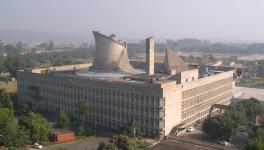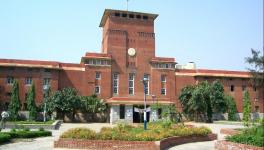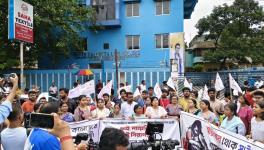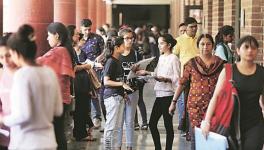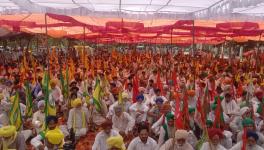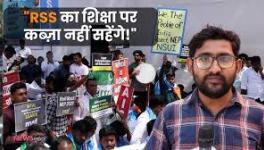Punjab: Students March to Protest Against Centralisation of Panjab University, Demand Resolution in State Assembly
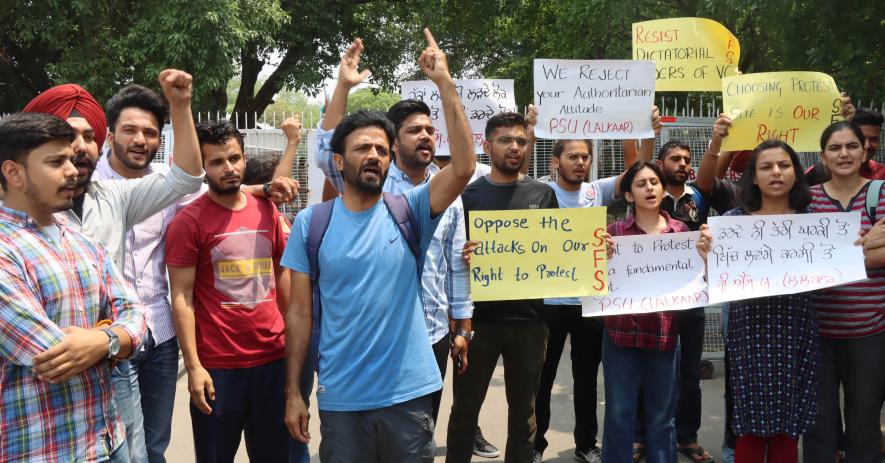
Image Courtesy: Tribune India
In one of the biggest students' marches in the recent history of Punjab, thousands of students from different state universities marched on the streets of Chandigarh to protest the prospects of centralisation of Panjab University. The issue gained prominence after the Punjab and Haryana High Court asked the Central government to explore possibilities of turning Panjab University into a central university and file its affidavit by August 30.
With slogans like 'Hands off Panjab University,' the students began their protest march from Amb Sahib Gurudwara and moved towards Punjab Raj Bhawan to meet Chief Minister Bhagwant Mann. However, they were forcefully stopped at YPS Chowk after a brief lathicharge leaving at least nine students injured. The lathicharge was criticised by all major political parties and farmers' organisations.
Shiromani Akali Dal Chief Sukhbir Singh Badal said that his party would launch an agitation if the character of the university were changed.
The protesting students have been demanding Punjab Government make its stand clear on the issue as it would deeply affect over 1 lakh university students enrolled in 200 affiliated colleges. They have been alleging that the centralisation of the university would come at the cost of the federal character and the glorious past of 130 years.
GENESIS OF THE PROTESTS
The protests by students' organisations began after the Punjab and Haryana High Court sought the response of the Union government to turn Panjab University into a central university. The court was hearing a plea of a teacher who had sought an extension of service tenure from 60 to 65.
The court observed that the Centre had already notified central service rules for the employees of Chandigarh Union Territory. However, rules remain silent on the employees of higher education institutions in Chandigarh.
Panjab University is an inter-state body corporate governed by Punjab University Act, 1947, where rules were made by the Centre alone.
Understanding the journey of Panjab University cannot be complete without understanding the history of Punjab. The university was established in 1882 in Lahore by the British colonial government.
Post-independence, the university campus too was partitioned. In its initial days, it functioned from its administrative office in Solan. In 1956, the university was shifted to Chandigarh when designers of the Chandigarh, Pierre Jeanneret and Le Corbusier, dedicated a place in sector-14 of Chandigarh. The university served different educational institutions across Patiala and East Punjab States Union (PEPSU).
After the recommendations of the States Reorganisation Commission, the union was divided into three states; Punjab, Haryana and Himachal Pradesh.
Haryana and Himachal Pradesh established Kurukshetra University and Himachal Pradesh University, respectively, to govern colleges in their territory. Panjab University was expected to be handed over to Punjab. Still, it remained with the Centre as an inter-state body corporate where the Centre and Punjab government would contribute funds and human resources. However, Punjab could not contribute its share over the years due to mounting debt.
MOVE TO PROMOTE SAFFRONISATION
The students maintain that the centralisation of the university would open avenues for the Narendra Modi government to appoint its teachers who have been openly advocating for the saffronisation of education.
Sandeep Singh, President, Students for Society, told NewsClick that the centralisation would deprive thousands of poor students from the state whose forbears gave away their land to build Chandigarh.
"Chandigarh came into existence after uprooting 28 villages of Punjab. So, the university belongs to its people. Any university's location should be seen with its historicity, culture and local needs. Historically, it has been associated with Punjab. Parliament passed Panjab University Act, 1947, legislation to support its continuity. This university's governance structure remains unique because the members of the highest decision-making body, the Senate and Syndicate, are democratically elected. Every decision gets a nod from these bodies. However, it would change with centralisation. The central bodies are pursuing higher education institutions to implement a new education policy. This policy is asking for the formation of a Board of Governors to implement the Centre's decisions. Centralisation would demolish democratic structures in the university. The plaintiff in the case may argue that centralisation would bring more funds, but it's a blatant lie for their petty interests. Central Universities are taking loans from Higher Education Funding Agency to run operations."
Singh added that the poor students of the state would not be able to compete with privileged students trained in coaching Centres because centralisation would come along with the common university entrance test (CUET).
When asked about the dwindling contribution of Punjab's share of funding, Singh said that states are slipping into a debt trap after the Centre came up with Goods and Services Tax (GST), where states are nothing more than municipalities.
Commenting on a meeting with Officer on Special Duty (OSD) in Chief Minister's office on Friday, Singh said that the organisations demanded that Punjab Government should pass a resolution in Punjab Assembly to assert its right on the university, represent the state in the High Court effectively and allocate enough funds to the higher education sector.
Amrit Pal, who represented the Students Federation of India, told NewsClick that the movement would have sharpened if the state government accepted their demand.
"Although the dialogue with OSD happened in an amicable environment, it was quite baffling that he was unaware that the state government is a party to the case. We will wait for their reply and further meet with CM Mann."
Kulwinder Singh, Assistant Professor at University Business School, Panjab University, told NewsClick that the loss would be multi-faceted, including reduced strength of teachers.
Talking to NewsClick over the phone, he said that the worst sufferers of the centralisation would be students, even when they have no say in decision-making.
"Panjab University currently caters to about 1 lakh students from Punjab, Haryana and Himachal Pradesh. Post Centralisation, it would be left with 10,000 students in its main campus and other centres. The rest of the students would be compelled to private universities. There would be a direct impact on non-teaching staff too. Currently, we have 4,000 plus staff to serve one lakh students. The strength would come down steeply because it would no longer need them to serve a trimmed population of students. Third, the strength of teachers would come down from 1,000 to 500 too. The teachers also need to understand that they would lose their arrears of five years. Another major loss would be the backlog of SC/ST candidates, as 500 posts would be eliminated post centralisation."
PU ACT SHOULD NOT BE TOUCHED
However, Professor Arun Grover, former Vice-Chancellor, Panjab University, believes that the remarks of the Punjab and Haryana High Court have very little to do with the centralisation issue.
"The high court remarked on the plea of a law professor who asked that her retirement age should be 65 and she must get salary as per seventh pay commission. She argued that Punjab Engineering College, a deemed university run by the Chandigarh Union Territory Administration, is giving salaries per the seventh pay commission and fixed retirement age at 65. UT administration had announced that the retirement age of teachers in colleges affiliated with Panjab University should be 65. High court's remarks are limited to these two small petitions."
Grover added that the students' protest is linked to misinformation spread by a nominated senator, who alleged that these two things would be applied to the university by default if Punjab University Act is replaced with Central Universities Act.
" As per Panjab University Act, the salary and retirement age are the responsibility of the central government. Let's read Panjab University Act, 1947, in conjunction with the Punjab Re-organisation Act, 1966. It is clear that the vice-chancellor would be appointed by a chancellor who was governor of Punjab since 1966. After re-organisation, the Vice President of India has this responsibility. As far as any changes in Panjab University Act are concerned, they can be done through the Union Ministry of Education, not the Punjab Government. So, the government in Punjab University Act is the Central government."
"In 2017, while reviewing the financial part of the university, the Central government gave in writing that its responsibility would be limited to paying salaries of teachers and 1516 non-teaching staff. How did it arrive at the number 1516? The university's sanctioned strength for teachers is 1378. The Centre said it would only provide salaries of 1.1 times non-teaching staff compared to teachers. It followed Central Universities Act in determining the number of non-teaching staff. As per directives, the Central government gives Rs 208 crores to pay teachers and non-teaching staff salaries. The Central government has not decided on the retirement age for the last eight years. So, without changing the Punjab University Act and bringing the institution under Central Universities Act, the issue of salaries and retirement can be trivially resolved. Still, the Central government is silent on it."
Grover added that students are agitated because they think they will be deprived of their representation in the senate. The Central government is using it as a ploy to say things can be fixed by bringing the university under the Central Universities Act.
"In my personal opinion, it need not do it."
Grover maintained that the university would also lose more than Rs 100 crore if centralisation occurred.
"Currently, 200 colleges of Punjab are affiliated with Panjab University, generating about Rs 150 crore of income. The cost of conducting examinations is just Rs 40 crores. Losing this income would mean the closure of the university. The university has 4,000 non-teaching employees. The Centre gives salaries of 1,516 non-teaching staff only. Even if it is made a central university, its expense would hardly come down by Rs 20 crore, but income loss would be Rs 100 crore. You can raise the fee only to a certain level. There would be chaos once the staff do not get their salaries."
Get the latest reports & analysis with people's perspective on Protests, movements & deep analytical videos, discussions of the current affairs in your Telegram app. Subscribe to NewsClick's Telegram channel & get Real-Time updates on stories, as they get published on our website.










